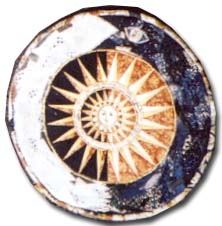Spiders of the genus Habronattus a nice site about a genus of jumping spiders
Sunday, November 30, 2003
The webs she paints Jacobs has developed -- it's taken a year and a half -- a way to paint the webs while they're attached by their guidelines. Before applying any paint, she shoos the spider away with a twig. Then she brushes a coat of a clear material onto a painted gourd and sweeps the gourd through a web. The fibers adhere and unique art is created."
She also claims :"I believe that I'm the only one in the world doing spider web art," Jacobs said. but uh uh you're not the only one.
She also claims :"I believe that I'm the only one in the world doing spider web art," Jacobs said. but uh uh you're not the only one.
Saturday, November 29, 2003
Tobacco Plants Produce Spider Silk: "Transgenic tobacco plants have successfully synthesized spider silk, a development that could allow industrial-scale production of synthetic spider silk that's as strong as the real stuff. E.S. Piruzyan and colleagues from the Institute of General Genetics in Moscow, Russia are seeking ways to produce the silk in industrial quantity because of its strength and toughness"
Tuesday, November 25, 2003
Keeping and Handling Spiders: "Removing an unwanted spider from the home: Anyway, to remove the spider, merely approach the animal quietly (no, they will not jump onto you), and place a transparent jar gently over it, so that the animal ends up in the jar, being careful not to crush the legs. Then insert a piece of firm paper or card between the jar and the surface on which the animal is sitting. Keep the card against the mouth of the jar until you are outside where the animal can be released. No, don't rush out as if you are carrying a time-bomb - you'll probably trip over the cat. "
Monday, November 24, 2003
Invasion II: "It was the middle of the night and I heard a pitter patter on my wall... I thought it might have been water leaking from the ceiling. I'll leave you to imagine the words which involuntarily tumbled out of my mouth on seeing this badger trotting up the wall. It's not normal to be able to hear spiders walking..." nice photo of a trapped sparassid, complete with quasi-hysterical comments :)
Sunday, November 23, 2003
Han van der Voort's Homepage "I have always had a special interest in spiders. I am amazed by their different techniques in catching preys, sometimes their own size or larger. Some spiders simply stalk and jump their victims, killing them with a poisonous bite. But many spiders use techniques so fascinating that they make the aliens in most science-fiction horror films seem dull." except maybe Alien :)
my tiny garden nice macro photos of all sorts of tiny animals, including spiders. needs flash.
Wednesday, November 19, 2003
Sunday, November 16, 2003
Spider web Frame: "Learn to love these beneficial garden predators by framing their artful webs. Watch your garden improve dramatically as this spider web frame is incorporated into your garden."
Wednesday, November 12, 2003
Saturday, November 08, 2003
Pesticides May Help Rather Than Harm Brown Recluse Spider: very surprising findings-" So many spiders in one place made Sandidge wonder how these creatures build and maintain their large numbers. His research led him to a surprising discovery: While the brown recluse will sometimes eat live prey like other spiders, it also is a scavenger, preferring dead over live prey" See also Sandidge's website about the brown recluse spider.
Friday, November 07, 2003
Fossil points to ancient spider webs: " A spider that walked on land about 55 million years before the dinosaurs may have been able to spin a web. Researchers say they've found signs of silk spinning structures on the 300-million-year-old arachnid."
Monday, November 03, 2003
Death by color:Spiny spiders' bright stripes attract prey "Hauber observed spiny spiders (Gasteracantha fornicata ) in northeastern Australia. He covered the yellow-black striped dorsal surface on the spiders' backs with ink from a black felt-tip pen. Spiders with the black dorsal surface caught less prey than spiders with their normal colorful stripes. Repeatedly he found that the blackened spiny spider always attracted and caught less prey."

